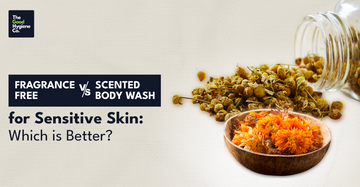When it comes to body wash for sensitive skin, most consumers are advised to “just avoid fragrance.” But is it really that simple?
In clinical dermatology, the debate between fragrance-free and scented body washes goes far beyond personal preference or mild irritation. It touches on the skin’s immunological memory, barrier dysfunction, chemical sensitization, and even the impact of artificial scents on your hormonal health.
Here’s the doctor-backed truth behind why this decision matters more than you think—and how to choose the safest option based on science, not just skin type.
The Hidden Problem with Fragrance in Body Washes
Fragrance in skincare isn’t just one ingredient. It’s often a blend of 30–200+ synthetic and natural compounds, many of which are not disclosed due to proprietary laws. For people with sensitive skin, this lack of transparency is the real concern.
But there’s more. Even if your skin doesn’t seem to react to fragrance now, it may still be:
- Increasing subclinical inflammation (invisible irritation at the cellular level)
- Weakening your stratum corneum (outer skin barrier) (1)
-
Creating immunological memory, which means reactions can develop months or years later
Understanding Skin Barrier Dysfunction
Your skin isn’t just a wall—it’s a smart, semi-permeable barrier that responds to what it touches. In sensitive skin, the lipid matrix that holds cells together is already compromised. Introducing allergens or irritants—like synthetic fragrances or essential oils—triggers an inflammatory cascade.
When your body wash for sensitive skin contains fragrance, the risk isn’t just surface-level dryness. It's deeper:
- Transepidermal Water Loss (TEWL) increases
- Cytokines like IL-6 and IL-8 elevate (biomarkers of inflammation)
- Over time, this weakens skin’s tolerance and leads to chronic reactivity
Why "Fragrance-Free" Isn’t Always Honest
Labels like “fragrance-free” or “unscented” can be misleading. Some products use masking agents—ingredients that suppress or neutralize odor, but are themselves sensitizers.
For example:
- Benzyl alcohol
- Citral
- Limonene
- Geraniol
These are naturally occurring in essential oils and are still classified as fragrance allergens under EU regulations. That’s why a truly safe body wash for sensitive skin must go beyond fragrance-free claims and be tested for allergenicity, preferably under dermatological supervision.
What About Natural Fragrances? Are They Safer?
Not necessarily. Natural fragrances (like lavender, rose, or sandalwood essential oil) may sound safer, but many are highly allergenic. Linalool and eugenol, two common fragrance compounds in nature, are on the top 26 allergens list regulated by the EU.
In fact, essential oils can be more volatile than synthetic fragrances, increasing the chance of percutaneous absorption and irritation—especially in sensitive or broken skin.
The Science of Neurodermatology & Scent
Here’s something most beauty blogs won’t tell you: fragrance affects your nervous system, not just your skin.
Fragrances—especially synthetic musks and phthalates—can interact with olfactory receptors not just in your nose, but also in your skin and gut, altering hormone signals and neurotransmitter activity.(2)
This is especially concerning for sensitive individuals who already have:
- Inflammatory skin disorders (eczema, rosacea)
- Neurogenic inflammation (itch triggered by stress, heat, or touch)
-
Mast cell activation (triggering histamine release from tiny stimuli)
In these cases, using a scented body wash—even if it doesn’t sting—can worsen symptoms over time via invisible triggers.
Why Fragrance-Free Body Washes Should Be pH-Balanced & Barrier-Safe
A truly effective body wash for sensitive skin must do three things:
- Avoid fragrance and masking agents completely
- Maintain a skin-friendly pH (4.5 to 5.5) to support the acid mantle
- Use non-stripping surfactants like sodium cocoyl isethionate or coco-glucoside
In premium formulations developed by dermatologists, you’ll also find:
- Polar lipids to repair barrier function
- Colloidal oat or bisabolol for calming micro-inflammation
- Humectants like glycerin or panthenol for moisture retention
How to Choose the Right Body Wash for Sensitive Skin: Medical Checklist
- Fragrance-free (no essential oils, masking agents, or synthetic perfume)
- Clinically tested on sensitive and atopic-prone skin
- Free from sulfates, parabens, formaldehyde releasers, and dyes
- pH balanced and soap-free
- Dermatologist-formulated with transparent ingredient listing
If your skin is sensitive, reactive, or prone to flare-ups, this is not a luxury—it’s a medical-grade necessity.
Expert Tip from Our Formulators:
Many people with sensitive skin are unknowingly sensitized to fragrance preservatives like methylisothiazolinone (MI) or emulsifiers like PEGs. We recommend starting a fragrance-free routine for at least 30 days and observing changes in itching, redness, or tightness after bathing.
Bottom Line
For sensitive skin, fragrance-free wins hands down—but only when it’s truly free from hidden allergens. While scented body washes might offer a spa-like experience, the long-term consequences for barrier health, immune response, and inflammation outweigh any short-term pleasure.
If you want safe indulgence, consider pairing a fragrance-free body wash for sensitive skin with a separate, patch-tested moisturizer or natural scent applied only to clothing—not directly on skin.
For optimal results, choose dermatologist-formulated body washes designed specifically for sensitive, reactive, and barrier-damaged skin, with full ingredient transparency and clinical-grade safety.
References:
1. The Role of Moisturizers in Addressing Various Kinds of Dermatitis: A Review - 2017 Dec - https://pmc.ncbi.nlm.nih.gov/articles/PMC5849435/#:~:text=and%20maintain%20plasticity.-,10,natural%20moisturizing%20factor%2C%20and%20desquamation.
2. Do Synthetic Fragrances in Personal Care and Household Products Impact Indoor Air Quality and Pose Health Risks?






